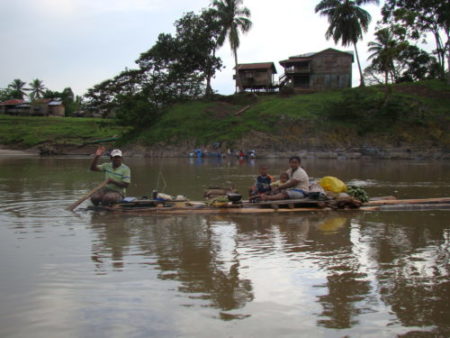Miles and miles of seemingly endless bends and turns in the river cut through the jungle dividing Honduras from Nicaragua. The first 14 hours in our large dugout canoe-style boat was eye opening. This ribbon of water known as the Rio Coco is the lifeblood of the indigenous Miskito people who call its southern banks home. Last November, our small team of 4 made our way down the river to visit the OneMeal feeding centers in the remote village communities and churches that have been planted along the Rio Coco over the past 15 years.
With our little motor trolling around 10 miles per hour, and just enough room for 5 passengers, a captain and a navigator, we were noticeably the fastest moving vessel on the river. We passed several other dugouts shuttling people and produce slowly up and down the river, some of which were propelled by a young man with a rough-hewn wooden paddle, others simply floated along with the current. The pace along the river was beyond slow. Several times we passed small Tom Sawyer-like rafts, loaded down with plantains or corn, with a man sprawled across the top of his load to disperse his bodyweight enough to keep the raft afloat. Our captain explained to us that villagers would float like this for 4-6 days to take their crops to market in the nearest town.
After visiting our first village, we transferred to a small aluminum fishing boat that could take us through the river at a quicker pace. For the following 4 days and many more hours on the river, we visited with pastors and church leaders, families and children in several of the remote communities along the Rio Coco. What we found among the extreme poverty and isolation, witchcraft and animism, was a bright light shining in the darkness in the humble local church bodies.
Eighteen churches have been planted along the Rio Coco by our partner, Pastor Earl Bowie and the Verbo Church. Each church is led by a local village pastor, and leaders they are training up from their own village. The most memorable part of our visit to these churches was the time we spent talking with Pastor Garlan in Sang Iskipulas. He shared with us how the people of his village were so caught off guard when the feeding center opened, and they told him they’d “never seen a church do something good to serve the community”. These village churches, 6 of which currently have OneMeal feeding centers, stand out as a place where all are welcomed, loved, and served because of Christ’s love. It didn’t take long for our hearts to align with these wonderful communities. God is calling us into His work along the Rio Coco. Since our trip, each of the village pastors and leaders have attended our KIDStory Workshop – an interactive training where participants learn to share the Gospel with children through dynamic storytelling. Six more village feeding centers are being planned to equip the local church to meet the needs of the children in their communities. A KATW Impact Team will travel to one of these villages in early 2018 to install the first playground anywhere along the river. Verbo Church has begun a plantain farm in each community to help the pastor and church become self-sustaining. And many more trainings and projects are a part of our vision to resource the local church to impact the lives of tens of thousands of kids in these communities with God’s transforming hope.
 Throughout our journey, it became evident that the most limiting factor for these communities was their extreme isolation. The river is the only way in and out, and for most, they will never leave their village simply because they do not have the means to. It became rapidly apparent to us as we traversed this amazing region that in order to continue to work here, this ministry needed its own boat!
Throughout our journey, it became evident that the most limiting factor for these communities was their extreme isolation. The river is the only way in and out, and for most, they will never leave their village simply because they do not have the means to. It became rapidly apparent to us as we traversed this amazing region that in order to continue to work here, this ministry needed its own boat!
A boat could transport pastors to training, plantains to market, volunteers to project sites, OneMeal food to village feeding centers, playgrounds to outreach centers, and so much more. By equipping Pastor Earl and the men and women along the Rio Coco with a boat as a ministry tool, we could impact 18 villages and expand this ministry to plant new churches in unreached communities. How exciting!

